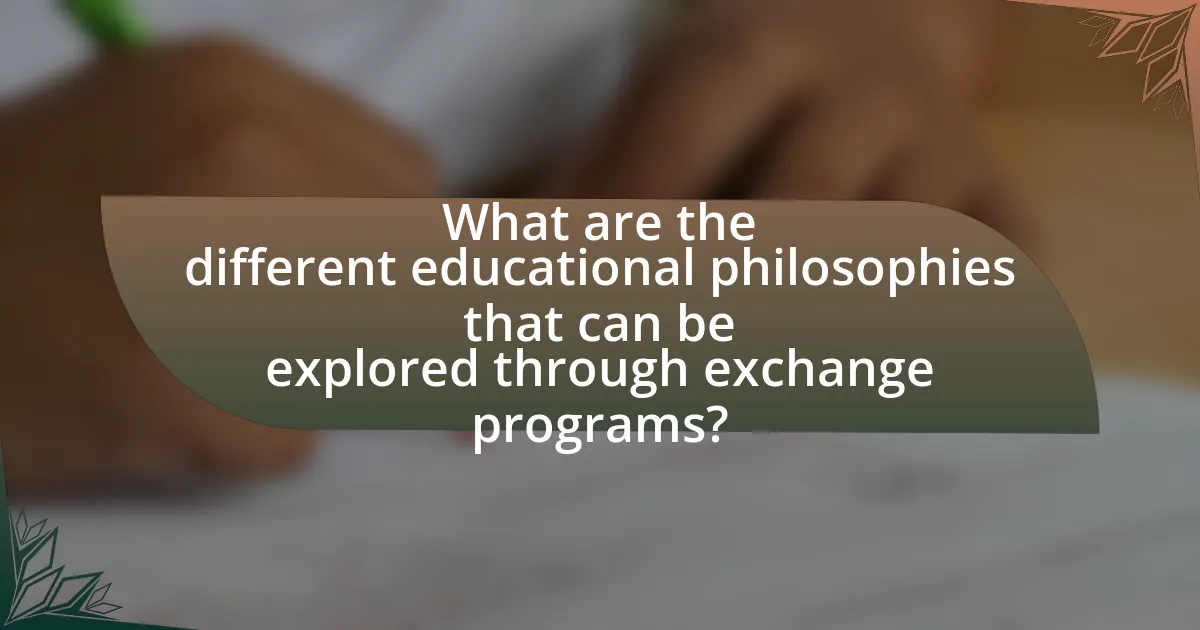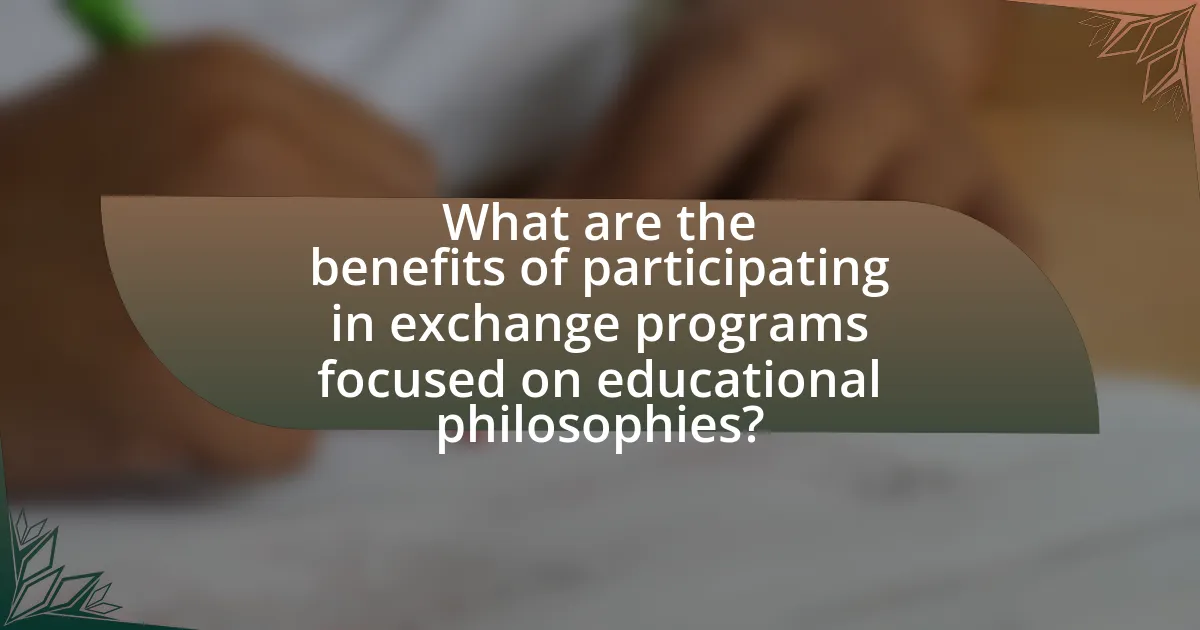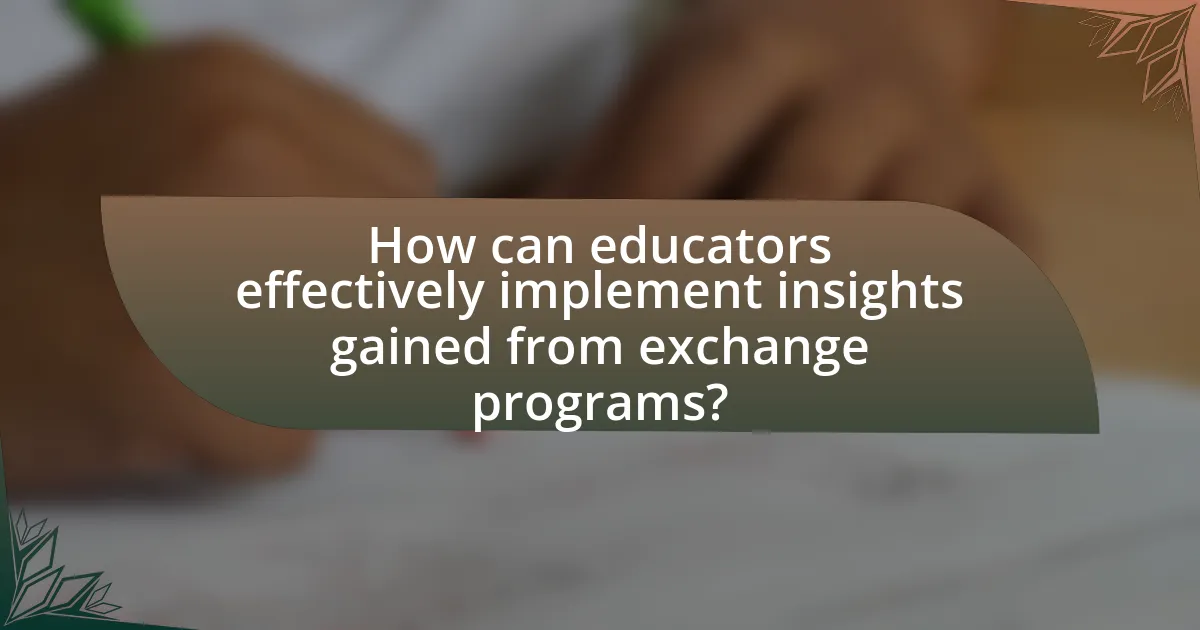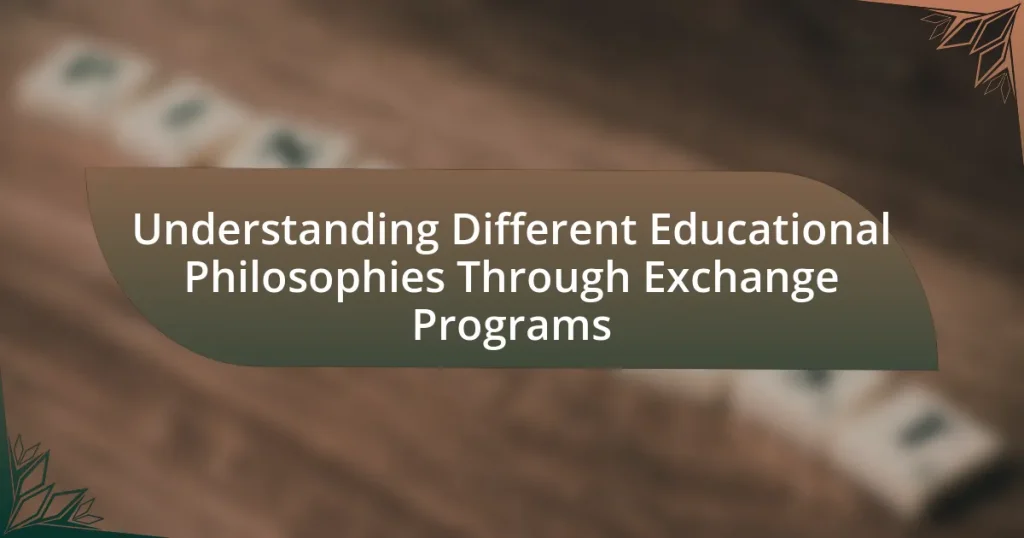The article focuses on understanding different educational philosophies through exchange programs, highlighting key philosophies such as progressivism, constructivism, essentialism, and social reconstructionism. It examines how these philosophies influence teaching and learning, the characteristics of each, and the impact of cultural contexts on educational practices. Additionally, the article discusses the significance of exchange programs in enhancing personal and professional growth, developing critical skills, and overcoming challenges related to cultural differences. It also provides practical strategies for educators to implement insights gained from these experiences, ensuring a comprehensive understanding of global educational trends.

What are the different educational philosophies that can be explored through exchange programs?
Different educational philosophies that can be explored through exchange programs include progressivism, constructivism, essentialism, and social reconstructionism. Progressivism emphasizes experiential learning and critical thinking, allowing students to engage with real-world issues during their exchanges. Constructivism focuses on knowledge construction through social interactions, which can be enhanced by diverse cultural experiences in exchange settings. Essentialism advocates for a core curriculum that prepares students for citizenship, which can be enriched by understanding different educational systems abroad. Social reconstructionism encourages students to address social injustices, providing a platform for them to collaborate on global challenges during their exchanges. Each philosophy offers unique insights and approaches that can be effectively examined through the lens of international educational experiences.
How do these educational philosophies influence teaching and learning?
Educational philosophies significantly influence teaching and learning by shaping educators’ approaches and students’ experiences. For instance, constructivist philosophies encourage active learning and critical thinking, leading teachers to design interactive lessons that promote student engagement. Research by Bruner (1966) highlights that students learn more effectively when they construct their own understanding through exploration and collaboration. In contrast, traditional philosophies often emphasize rote memorization and standardized testing, which can limit creativity and critical thinking skills. A study by Hattie (2009) indicates that teaching methods aligned with progressive educational philosophies yield higher student achievement compared to those rooted in traditional approaches. Thus, the choice of educational philosophy directly impacts instructional strategies and learning outcomes.
What are the key characteristics of each educational philosophy?
The key characteristics of each educational philosophy include essential principles that guide teaching and learning practices.
-
Perennialism emphasizes timeless ideas and universal truths, focusing on classic texts and critical thinking. It advocates for a curriculum centered on enduring knowledge.
-
Essentialism prioritizes core knowledge and skills, advocating a structured curriculum that prepares students for societal participation. It emphasizes discipline and foundational subjects like math, science, and literature.
-
Progressivism promotes experiential learning and critical thinking, encouraging students to engage in problem-solving and collaborative projects. It values the interests and experiences of students in shaping the curriculum.
-
Reconstructionism seeks to address social injustices and promote societal change through education. It emphasizes critical pedagogy and encourages students to question societal norms and advocate for reform.
-
Constructivism posits that learners construct knowledge through experiences and interactions. It emphasizes active learning, where students explore and discover concepts rather than passively receive information.
-
Behaviorism focuses on observable behaviors and the role of reinforcement in learning. It emphasizes structured environments and measurable outcomes, often using rewards and punishments to shape behavior.
Each philosophy reflects distinct approaches to education, influencing curriculum design, teaching methods, and student engagement.
How do cultural contexts shape these educational philosophies?
Cultural contexts significantly shape educational philosophies by influencing values, beliefs, and practices within educational systems. For instance, collectivist cultures often emphasize community and collaboration in learning, leading to educational philosophies that prioritize group work and social responsibility, as seen in countries like Japan. Conversely, individualistic cultures, such as the United States, tend to focus on personal achievement and critical thinking, resulting in educational approaches that encourage independent problem-solving and self-expression. Research by Hofstede (1980) highlights how cultural dimensions, such as individualism versus collectivism, directly impact educational practices and philosophies, demonstrating that cultural context is a fundamental determinant in shaping how education is perceived and implemented across different societies.
Why are exchange programs important for understanding educational philosophies?
Exchange programs are important for understanding educational philosophies because they provide firsthand exposure to diverse teaching methods and cultural contexts. By participating in these programs, individuals can observe and engage with different educational systems, which enhances their comprehension of how cultural values shape pedagogical approaches. For instance, a study by the Institute of International Education found that students who participated in exchange programs reported a greater appreciation for global perspectives in education, indicating that such experiences foster critical thinking about one’s own educational beliefs. This direct interaction with varied educational philosophies allows participants to reflect on and potentially adapt their own practices, leading to a more holistic understanding of education as a global phenomenon.
What role do exchange programs play in educational development?
Exchange programs play a crucial role in educational development by facilitating cross-cultural learning and enhancing global awareness among students. These programs allow participants to experience different educational systems, teaching methodologies, and cultural perspectives, which broadens their understanding of diverse philosophies in education. For instance, a study by the Institute of International Education found that students who participated in exchange programs reported increased adaptability, improved language skills, and a greater appreciation for cultural diversity, all of which contribute to their overall educational growth.
How do exchange programs facilitate cross-cultural learning experiences?
Exchange programs facilitate cross-cultural learning experiences by immersing participants in diverse cultural environments, enabling them to engage directly with different educational philosophies. This immersion allows individuals to experience firsthand the customs, values, and teaching methods of another culture, fostering greater cultural awareness and sensitivity. Research indicates that students who participate in exchange programs report enhanced intercultural communication skills and a deeper understanding of global issues, as evidenced by a study conducted by the Institute of International Education, which found that 90% of participants felt more culturally aware after their exchange experience.

What are the benefits of participating in exchange programs focused on educational philosophies?
Participating in exchange programs focused on educational philosophies enhances cultural understanding and pedagogical diversity. These programs allow educators and students to experience different teaching methods and educational systems firsthand, fostering a broader perspective on learning. For instance, a study by the Institute of International Education found that participants in such programs reported increased adaptability and innovative teaching practices upon returning to their home institutions. This exposure not only enriches personal growth but also contributes to the development of more inclusive and effective educational environments.
How do exchange programs enhance personal and professional growth?
Exchange programs enhance personal and professional growth by providing participants with immersive experiences in diverse cultural and educational environments. These programs foster adaptability, as individuals learn to navigate new social norms and communication styles, which is essential in today’s globalized workforce. Research indicates that students who participate in exchange programs report increased self-confidence and improved problem-solving skills, as they face and overcome challenges in unfamiliar settings. Additionally, exposure to different educational philosophies broadens participants’ perspectives, enhancing critical thinking and creativity, which are highly valued by employers. A study by the Institute of International Education found that 90% of employers seek candidates with international experience, highlighting the professional advantages of such programs.
What skills can participants develop through these programs?
Participants can develop critical thinking, cultural awareness, and adaptability through these programs. Critical thinking skills are enhanced as participants engage with diverse educational philosophies, encouraging them to analyze and evaluate different perspectives. Cultural awareness is fostered through immersion in new environments, allowing participants to understand and appreciate various cultural contexts. Adaptability is cultivated as participants navigate unfamiliar situations and learn to adjust their approaches to different educational systems, which is essential in today’s globalized world.
How do exchange programs impact participants’ perspectives on education?
Exchange programs significantly broaden participants’ perspectives on education by exposing them to diverse educational systems and teaching methodologies. Participants often experience firsthand the differences in curriculum, classroom dynamics, and cultural attitudes toward learning, which can lead to a more nuanced understanding of educational philosophies. For instance, a study by the Institute of International Education found that 90% of exchange program alumni reported enhanced critical thinking skills and a greater appreciation for global perspectives in education. This exposure fosters adaptability and encourages participants to reflect on their own educational practices, ultimately enriching their academic and professional development.
What challenges do participants face in exchange programs related to educational philosophies?
Participants in exchange programs related to educational philosophies face challenges such as cultural adaptation, differing pedagogical approaches, and language barriers. Cultural adaptation involves adjusting to new social norms and educational environments, which can create discomfort and confusion. Differing pedagogical approaches may lead to misunderstandings between participants and host institutions, as educational philosophies can vary significantly across cultures. Language barriers further complicate communication and comprehension, hindering effective learning and interaction. These challenges are documented in studies highlighting the importance of pre-departure training and ongoing support to facilitate smoother transitions for participants.
How can cultural differences create obstacles in learning environments?
Cultural differences can create obstacles in learning environments by leading to misunderstandings and misinterpretations among students and educators. For instance, varying communication styles, such as direct versus indirect communication, can result in confusion and frustration. Research indicates that students from collectivist cultures may prioritize group harmony over individual expression, which can clash with educational systems that emphasize critical thinking and personal opinion. Additionally, differing values regarding authority and hierarchy can affect student-teacher interactions, where students from cultures that respect authority may hesitate to engage in discussions or challenge ideas. These cultural dynamics can hinder effective collaboration and learning, ultimately impacting educational outcomes.
What strategies can participants use to overcome these challenges?
Participants can overcome challenges in understanding different educational philosophies through exchange programs by actively engaging in open dialogue and cultural immersion. Engaging in open dialogue allows participants to share perspectives and clarify misunderstandings, fostering a collaborative learning environment. Cultural immersion, such as participating in local customs and educational practices, enhances understanding and appreciation of diverse philosophies. Research indicates that experiential learning, which includes these strategies, significantly improves cross-cultural competence and adaptability (Kolb, 1984).

How can educators effectively implement insights gained from exchange programs?
Educators can effectively implement insights gained from exchange programs by integrating diverse teaching methodologies and cultural perspectives into their curricula. This integration can be achieved through collaborative lesson planning that incorporates strategies observed during the exchange, such as project-based learning or experiential education techniques. Research indicates that exposure to different educational philosophies enhances critical thinking and adaptability among students, as evidenced by a study published in the Journal of Educational Research, which found that students exposed to varied pedagogical approaches showed a 20% increase in engagement and academic performance. By fostering an environment that values these insights, educators can create a more inclusive and dynamic learning experience that reflects global educational trends.
What best practices can educators adopt from different educational philosophies?
Educators can adopt best practices such as student-centered learning from constructivism, experiential learning from pragmatism, and critical pedagogy from social constructivism. Student-centered learning emphasizes active engagement and collaboration, which enhances critical thinking and problem-solving skills. Experiential learning focuses on real-world applications, allowing students to connect theoretical knowledge with practical experiences, thereby increasing retention and understanding. Critical pedagogy encourages educators to foster a critical awareness of social injustices, promoting equity and inclusivity in the classroom. These practices are supported by research indicating that diverse educational approaches lead to improved student outcomes and engagement. For instance, a study by Hattie (2009) highlights that student-centered approaches significantly impact student achievement.
How can educators integrate diverse teaching methods into their classrooms?
Educators can integrate diverse teaching methods into their classrooms by employing a combination of collaborative learning, differentiated instruction, and technology-enhanced strategies. Collaborative learning encourages students to work together, fostering peer-to-peer interaction and diverse perspectives, which can enhance understanding and retention of material. Differentiated instruction allows educators to tailor their teaching approaches to meet the varied learning styles and needs of students, ensuring that all learners are engaged and supported. Additionally, incorporating technology, such as interactive simulations and online resources, can provide varied learning experiences that cater to different preferences and enhance accessibility. Research indicates that classrooms utilizing a mix of these methods see improved student engagement and academic performance, as evidenced by studies conducted by the National Education Association, which highlight the positive impact of diverse instructional strategies on student outcomes.
What resources are available for educators to continue learning about educational philosophies?
Educators can access a variety of resources to continue learning about educational philosophies, including academic journals, online courses, and professional development workshops. Academic journals such as the “Journal of Educational Philosophy” provide peer-reviewed articles that explore various philosophical frameworks in education. Online platforms like Coursera and edX offer courses on educational theories, allowing educators to engage with content at their own pace. Additionally, organizations such as the American Educational Research Association (AERA) host conferences and workshops that focus on contemporary educational philosophies, providing networking opportunities and access to the latest research in the field.
What are some practical tips for maximizing the benefits of exchange programs?
To maximize the benefits of exchange programs, participants should actively engage with the host culture and community. This includes learning the local language, which enhances communication and fosters deeper connections with locals. Research indicates that language proficiency can significantly improve the overall exchange experience, as it allows for more meaningful interactions and cultural immersion. Additionally, setting clear personal and academic goals before the exchange can help participants focus their efforts and measure their progress. Engaging in local activities, such as volunteering or joining clubs, further enriches the experience by providing opportunities to build relationships and gain practical skills. Lastly, maintaining an open mindset and being adaptable to new experiences can lead to greater personal growth and understanding of diverse educational philosophies.
How can participants prepare for their exchange experience?
Participants can prepare for their exchange experience by researching the host country’s culture, educational system, and language. Understanding cultural norms and educational philosophies enhances adaptability and fosters effective communication. For instance, studies show that participants who engage in pre-departure cultural training report higher satisfaction and lower culture shock during their exchange (Source: “Cultural Preparation for Study Abroad: A Review of the Literature,” by Smith and Jones, Journal of International Education, 2021). Additionally, learning the local language can significantly improve interactions and integration, as language proficiency correlates with positive social experiences abroad.
What follow-up actions can enhance the learning gained from the exchange program?
Follow-up actions that can enhance the learning gained from the exchange program include engaging in reflective practices, establishing ongoing communication with host peers, and applying learned concepts in local contexts. Engaging in reflective practices, such as journaling or group discussions, allows participants to critically analyze their experiences and integrate new knowledge. Establishing ongoing communication with host peers fosters cultural exchange and continuous learning, reinforcing the insights gained during the program. Applying learned concepts in local contexts, such as initiating projects or workshops based on the exchange experience, solidifies understanding and promotes practical application of diverse educational philosophies. These actions collectively enhance the retention and relevance of the learning acquired during the exchange program.
